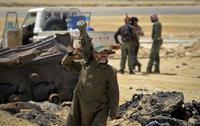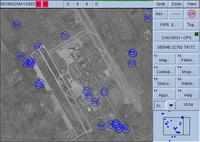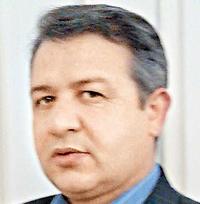-
Mexico accidentally invades U.S.
On Tuesday, the Mexican Army accidentally “invaded” the United States when thirty-three of its soldiers mistakenly crossed the border into Texas in Humvees; the soldiers were driving in a convoy consisting of four Humvees when they realized they had started driving on a bridge over the Rio Grande where they could not turn their vehicles around until they entered the United States
-
-
AWOL soldier arraigned in Fort Hood bomb plot
AWOL Pfc. Naser Jason Abdo was arraigned today, charged by federal prosecutors with possession of an illegal firearm; allegedly planned an off-base attack on Fort Hood personnel using explosives and firearms; Abdo had been charged with possession of child pornography prior to his disappearance
-
-
Where have Libya's antiaircraft missiles gone?

U.S. government officials fear that more portable anti-aircraft missiles may have slipped into the wrong hands or been sold in the black market after rebels in Libya raided one of Colonel Muammer el Qaddafi’s munitions depots; late last month rebels captured the city of Ga’a which contained an ammunition depot that housed Man-Portable Air-Defense Systems, lightweight surface to air missiles known as Manpads; in the ensuing chaos, the depot was raided and crates of weapons disappeared with no record of where they went
-
-
Congressman arrested for immigration protest
On Tuesday a U.S. lawmaker was arrested for organizing a sit-in in front of the White House; Representative Luis Gutierrez (D-Illinois), a staunch advocate for immigration reform, led a protest outside the White House to demand that President Barack Obama stop deporting undocumented immigrants
-
-
Terrorist recruitment in the United States
In a report submitted to House Homeland Security Committee hearings yesterday, the Anti-Defamation League (ADL) says that since the 9/11 attacks, a growing number of American citizens and residents motivated by radical interpretations of Islam have been involved in plots and conspiracies against American interests at home and abroad
-
-
State Department to begin tracking its personnel

The U.S. State Department will soon be able to track the movement of its staff as they conduct diplomatic missions in dangerous areas in countries like Pakistan, Iraq, Yemen, and Afghanistan; using the Blue Force Tracker system, the State Department will be able to monitor its personnel’s movements via a small transmitter attached to a vehicle, aircraft, or a person
-
-
Norway attacker claims did not act alone

Anders Behring Breivik, has pleaded not guilty to a bomb in downtown Oslo and a shooting spree at a summer camp which left scores dead, and when questioned by police, he said that there were “two further cells in our organization” and he did not act alone; police have been criticized for their slow response to the shooting on Utoya, as authorities took more than an hour to arrive on the island after the first reports of shootings
-
-
Law enforcement and privacy concerns in Vancouver
Last month, the police in the otherwise sedate Vancouver had to use tear gas, pepper spray, and flash bombs in downtown Vancouver to try to disperse angry rioters who set cars on fire, looted stores, and taunted police officers after the Canucks’ 4-0 Stanley Cup final loss to the Boston Bruins; the police wants to use facial recognition technology to identify the rioters, but privacy advocates are worried
-
-
Law enforcement and privacy concerns in Massachusetts
Massachusetts has a plan: create a database which could map drivers’ whereabouts with police cruiser-mounted scanners that capture thousands of license plates per hour — and store that information indefinitely so local police, state police, federal agencies, and prosecutors could access it as they choose; privacy advocates are worried
-
-
Another Iranian nuclear scientist killed in Tehran

On Saturday, Darioush Rezaei, a 35-year-old physics professor involved in Iran’s nuclear program, was killed outside is Tehran home by assailants on a motorcycle; Rezaei’s expertise — neutron transport — is at the heart of nuclear chain reactions in reactors and bombs; Rezaei joins an ever-growing list of Iranian nuclear scientists who have met an untimely death at the hands of mysterious assailants; the systematic, covert killing of nuclear scientists to prevent a country from building a bomb is a method Israel used successfully — if, at times, with collateral damage — against Egypt in the early 1960s and against Iraq in the 1980s; the precision and lethality of the current Israeli campaign against Iran’s nuclear weapons scientists shows Israel learned important operational lessons from those two campaigns
-
-
Cybersecurity legislation passes House Committee
Last week new cybersecurity legislation cleared its first obstacle passing through the House Science, Space, and Technology Committee; the bill would authorize the National Science Foundation and the National Institute of Standards and Technology (NIST) to establish standards across federal agencies as well as research and education
-
-
Tampa police already training for 2012 RNC convention
In preparation for next year’s Republican National Convention in Tampa Bay Florida, nearly every local police department employee is required to attend a three-day training course; the mandatory training is designed to teach officers how to control large crowds
-
-
The TSA-Chaffetz skirmish: The latest round
In the past ten days we have witnessed an intense legal-political skirmish between DHS and two of its staunchest critics on the Hill — Representatives Jason Chaffetz (R-Utah) and Darrell Issa (R-California); at issue is information that the Transportation Security Administration (TSA) had given the subcommittee headed by Chaffetz ahead of hearings the subcommittee was to hold on airport security; Chaffetz released the information in some of these documents to the press a day before the hearings, then repeated the information in his open-to-the-public opening statement; DHS angrily charged that in revealing the information, Chaffetz had violated the law
-
-
DHS wastes billions in procurement process
A recent DHS Inspector General report found that the agency had not leveraged its collective buying power thereby losing billions of dollars in potential cost savings; the report found that DHS’s various agencies individually bought $170 million worth of small x-ray machines, metal detectors, and hand-held radiation detectors rather than purchasing those items together, in a practice known as strategic sourcing.
-
-
DHS chastises Chaffetz for disclosing sensitive information

Last week, DHS officials chastised Representative Jason Chaffetz (R-Utah) for disclosing sensitive security information to the press; in a letter, Joseph Maher, DHS’s deputy counsel, scolded Chaffetz, the chair of the House Subcommittee on National Security, Homeland Defense, and Foreign Operations, for openly discussing “sensitive security information” provided by the Transportation Security Administration (TSA); the letter comes in response to Chaffetz’s comments last week that revealed that there have been more than 25,000 security breaches at U.S. airports since November 2001
-
More headlines
The long view
Factories First: Winning the Drone War Before It Starts
Wars are won by factories before they are won on the battlefield,Martin C. Feldmann writes, noting that the United States lacks the manufacturing depth for the coming drone age. Rectifying this situation “will take far more than procurement tweaks,” Feldmann writes. “It demands a national-level, wartime-scale industrial mobilization.”
No Nation Is an Island: The Dangers of Modern U.S. Isolationism
The resurgence of isolationist sentiment in American politics is understandable but misguided. While the desire to refocus on domestic renewal is justified, retreating from the world will not bring the security, prosperity, or sovereignty that its proponents promise. On the contrary, it invites instability, diminishes U.S. influence, and erodes the democratic order the U.S. helped forge.
Fragmented by Design: USAID’s Dismantling and the Future of American Foreign Aid
The Trump administration launched an aggressive restructuring of U.S. foreign aid, effectively dismantling the United States Agency for International Development (USAID). The humanitarian and geopolitical fallout of the demise of USAID includes shuttered clinics, destroyed food aid, and China’s growing influence in the global south. This new era of American soft power will determine how, and whether, the U.S. continues to lead in global development.
Water Wars: A Historic Agreement Between Mexico and US Is Ramping Up Border Tension
As climate change drives rising temperatures and changes in rainfall, Mexico and the US are in the middle of a conflict over water, putting an additional strain on their relationship. Partly due to constant droughts, Mexico has struggled to maintain its water deliveries for much of the last 25 years, deliveries to which it is obligated by a 1944 water-sharing agreement between the two countries.
How Disastrous Was the Trump-Putin Meeting?
In Alaska, Trump got played by Putin. Therefore, Steven Pifer writes, the European leaders and Zelensky have to “diplomatically offer suggestions to walk Trump back from a position that he does not appear to understand would be bad for Ukraine, bad for Europe, and bad for American interests. And they have to do so without setting off an explosion that could disrupt U.S.-Ukrainian and U.S.-European relations—all to the delight of Putin and the Kremlin.”
How Male Grievance Fuels Radicalization and Extremist Violence
Social extremism is evolving in reach and form. While traditional racial supremacy ideologies remain, contemporary movements are now often fueled by something more personal and emotionally resonant: male grievance.
